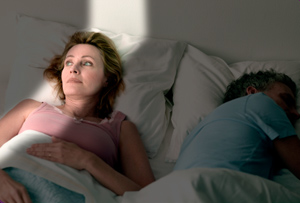Symptoms of Hypothyroidism in Women
Many symptoms are often elusive because there are so many different symptoms and they are connected to such a variety of systems in the body. Probably the most common system that displays symptoms of hypothyroidism is the reproductive system. Signs that often appear to be indicative of menopause, or pre-menstrual syndrome, often actually turn out to be symptoms of hypothyroidism in women.
Women of all ages can experience hypothyroidism. It’s important to know that the majority of people in all cases of this disorder are women and that while young women can be susceptible to symptoms of hypothyroidism in women as well, the majority of women are over the age of 30 or going through menopause.
If you suspect that your symptoms are in fact the common result of hypothyroidism then be sure run your own therapeutic trial and see if a good hypothyroidism treatment improves your symptoms.
While the condition does affect men as well, the incidence is not nearly as often and the symptoms are different in men than are the symptoms of hypothyroidism in women.
In order to get a good handle on the importance of knowing your body and knowing if you are experiencing any symptoms, let’s take a look at the thyroid and determine what it is and why it’s so important.
Thyroid Gland – The Reason for Symptoms of Hypothyroidism in Women
Like all the glands in your body, the thyroid manufactures hormones. Thyroid hormones control the body’s metabolism. Most of us think of weight gain or loss when we hear the word metabolism, but in reality, the thyroid hormones do much more than merely control your weight.
Not only does the thyroid regulate metabolism and determine the rate of body system functions, but it also controls how fast or slow your body uses the energy it produces.
An overactive thyroid is when the gland produces too much of the hormone; in turn an under-active thyroid produces too little. When a woman has an under-active thyroid, she will eventually develop symptoms of hypothyroidism in women until she begins eating a proper hypothyroidism diet to stimulate and heal her thyroid.
Some of the more common symptoms of hypothyroidism in women are connected to the reproductive system. Let’s take a look at some of those symptoms and then go over some of the other symptoms women experience when the thyroid gland is not working properly.
Symptoms of Hypothyroidism in Women
Reproductive System Symptoms

- Painful menstrual periods
- Irregular periods
- Excessive bleeding or clotting
- History of miscarriage
- Difficulty conceiving
- Uterine Fibroids
- Postpartum depression
- Low sex drive
- Breast milk when not lactating
- Fibrocystic or “lumpy bumpy” breasts
Although the symptoms of hypothyroidism in women can often be related to the reproductive system, that isn’t always the case. In fact there are many symptoms that are not at all related. Here is a check list of general symptoms that could be indicating a problem with hypothyroidism:
General Symptoms of Hypothyroidism in Women
- Weight gain/difficulty losing weight
- Slowness or slurring of speech
- Dry, brittle hair
- Chronic constipation
- Brittle nails that break easily
- Hoarseness
- Persistent cold sores or breakouts
- Puffy face
- Puffy fingers or toes
- High cholesterol levels
- Low energy level
- Pain in the neck area
- Noticeable lump in the neck area
Another way to determine if you may be experiencing symptoms of hypothyroidism in women is to see the check list below which indicates risk factors for the problem.
The following is a list of risk factors that may make you more prone to problems with your thyroid:
Risk Factors for Symptoms of Hypothyroidism in Women
- Use of lithium based mood stabilizers
- History of stress or stress related illnesses
- Use of birth control pills in women
- History of family member with thyroid disorder
- Menopause
- Pre-Menopause
Another symptom of hypothyroidism in women is depression, which is often manifested by the hormones in your body.
Along with menopause, which is a time when many women feel out of sorts or experience depression. In some cases, depression alone is the first warning that something is wrong with the thyroid gland.
There are other symptoms of thyroid that mimic the symptoms of menopause. It’s a good idea to have an understanding of what these are so you can make an educated decision as to whether you are experiencing true symptoms of hypothyroidism or menopause. As mentioned above, sometimes both conditions can occur at the same time.
Symptoms of Hypothyroidism in Women that Mimic Menopause

- Onset of depression that doesn’t go away in a few days or a week
- Loss of hair
- Mood swings
- Brittle nails
- Inability to sleep at night
- Exhaustion
- Sore breasts
- Lactation without childbirth
- Difficulty concentrating
- Unexplained weight gain
- Weight shift to midriff area
Unfortunately, most women in their middle years who experience the above symptoms are naturally diagnosed as being menopausal when they are really experiencing hypothyroid symptoms in women. Although having a hormone level test done is the usual procedure for determining if your thyroid is functioning properly, these tests are not always accurate.
A good number of the tests come back with a negative result, when in fact the real problem is that you are indeed suffering from symptoms of hypothyroidism in women.
Although most symptoms of hypothyroidism in women are not life- threatening, some can be quite serious and must be addressed. Other systems of the body can be impacted by hypothyroidism and in rare cases lead to serious illness.
That makes it important to not ignore your symptoms. If you can identify with any of those listed here, then you really need to take into consideration that you may have a problem with your thyroid.
Here are some of the other body systems that can be affected by an unhealthy thyroid gland:
- Cardiac and circulatory system
- Digestive system
- Joints and muscles
- Neurological system
There are a myriad of symptoms in each of these systems that can be indicative of a thyroid disorder.
It is important that you become involved in your own health by familiarizing yourself with the many different symptoms of hypothyroidism in women and determine if any of the symptoms you are currently experiencing may actually be attributed to your thyroid.









Leave a Reply
Want to join the discussion?Feel free to contribute!